RRFC: It seems like we’ve become addicted to screens in the studio, with the DAW and tracking on the grid. Do you think working on a grid has taken away the pocket over time?
Tre: Everyone loves the visual, and that’s fine, it’s certainly helpful, but…we didn’t always have the screen to look at. The most important thing is using your ears. You have to learn to tune the visual out and use your ears sometimes…Cutting things to a click track is important. I’ve done some projects, where we do what I call “freewheeling it” where it’s not done to a click, and we just roll tape and let them play. And unless you have a bunch of amazing players, that can get a little messy. So I don’t mind the metronome and the grid, I think that helps. What I think kind of sucks the life out of everything is all the technology. We’ve had metronomes for decades; that, I think, is fine. It’s the beat detecting every single drum hit so that it’s perfect. It’s just not human anymore. It’s fantastic for guys that maybe aren’t the best players that struggle, and so I’m able to take someone that can’t play all that great and actually make them pretty decent. But for the players that are good players or great players, why do we need to do that to them? They’re already great players. My favorite drummers that I get to work with, the reason I like them is because of their feel. They’re not always perfectly metronomical. It’s okay to rush things a tiny bit and push the beat, or it’s okay to lay back a little bit behind the beat, that’s what gives it a feel…When you go back and listen to a lot of the old stuff, like maybe old Motown stuff, you can feel they probably didn’t cut that to a click. And they’re certainly speeding up or slowing down, but the whole band is doing it together and it still feels great. And that’s why I think those records and songs have endured the test of time, because it’s human, you connect with it. There’s some humanity left in the music.
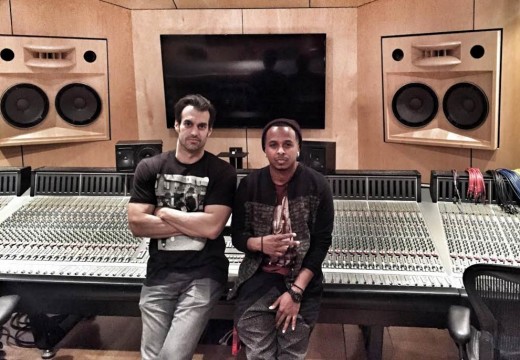
Recording Connection mentor Tre Nagella
and Dez Ward at Luminous Sound
When I met Dez, he seemed really motivated…He was a pretty good piano player and he had already had some sort of DAW at home that he was working with and he had been making tracks on his own…He just seemed real motivated and really friendly, and we just hit it off. He’s been one of my favorite students.
RRFC: Dez mentioned the Kirk Franklin sessions that he got to participate in really changed his life, that watching the creative process really inspired him. Do you remember anything from when he was hanging around that you started to see things click?
Tre: For him to get to sit in and see the caliber of musicians that play on those things and the hours we pull, and how much work goes into an album of that caliber, I think it’s probably an eye-opening experience. I know it was for me, when I was young… I’m glad he got to sit in on a number of those sessions and see what making a big record is like.
RRFC: Was he was able to maintain that fly-on-the-wall status and sort of speak when spoken to?
Tre: Yes, he’s really good at that, and that’s a big deal to me…My job is to facilitate [clients] to create, so it really bothers me when you get a guy that’s trying to talk to the client all the time, they’re trying to show them their beats they made at home and trying to get their phone number. You can’t do that, it’s not really appropriate. There is a studio etiquette. Write your questions down so that you can remember, and then when we’re alone and you want to ask me what was I doing, I’m more than happy to answer. But while the client’s paying big dollars to be in there and trying to create his album, that is not the time you start blurting out questions and trying to show some superstar tracking in your bedroom…Dez is really good with that, I don’t really need to tell him. I think, because of his age and maturity level, he gets that and I don’t really even have to say it, he just understands that.
RRFC: What advice do you have for apprentices to make the most out of the time they spend with you in sessions?
Tre: I think the things they could do to get the most out of the Recording Connection is just spend time at the studio…I can’t spend hours and hours and hours every day with you, I just don’t have the time. We’re going to do the lessons, that’s obvious, but you are welcome at the studio. The more you can be here and just be around…it may be boring sometimes, it may not always be something to do, but that’s when opportunities pop up…something happens all of a sudden and you’re there to jump on the opportunity or watching the other engineers. It doesn’t always have to be me that you might learn from, you might learn from another engineer that’s working in another room, go help them, go assist them even though I’m busy…I try and encourage the guys, “Come up here as much as you can, you’re always welcome, it’s not required but any time you want to come, just let me know.” I tend to let my students know when I’m there after hours, on weekends and just let them know ahead of time, I’m going to be here all day on Saturday just mixing by myself. So if you want to come up, you can sit over my shoulder and watch me or you can go in another room and do whatever you want. And the students that tend to excel are the ones that take me up on that.
* * * * *



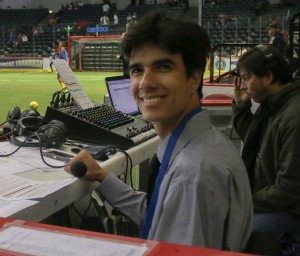
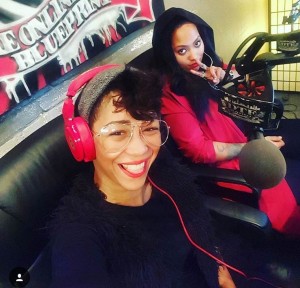
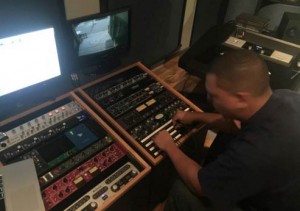
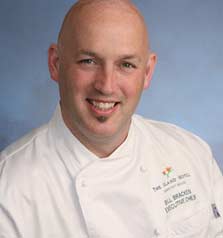 “Traditional culinary education to me is the apprenticeship mentorship approach. This is the way our culinary industry started out. I believe the mentorship approach to culinary education is a sound one. The profit loss statement of every culinary operation looks to productivity and efficiency as its number one priority. Having to re-teach culinary graduates is not only inefficient but also costly and time-consuming”
— Bill Bracken, Owner of “Bracken’s Kitchen” Food and Beverage Consulting, Los Angeles, CA
“Traditional culinary education to me is the apprenticeship mentorship approach. This is the way our culinary industry started out. I believe the mentorship approach to culinary education is a sound one. The profit loss statement of every culinary operation looks to productivity and efficiency as its number one priority. Having to re-teach culinary graduates is not only inefficient but also costly and time-consuming”
— Bill Bracken, Owner of “Bracken’s Kitchen” Food and Beverage Consulting, Los Angeles, CA




